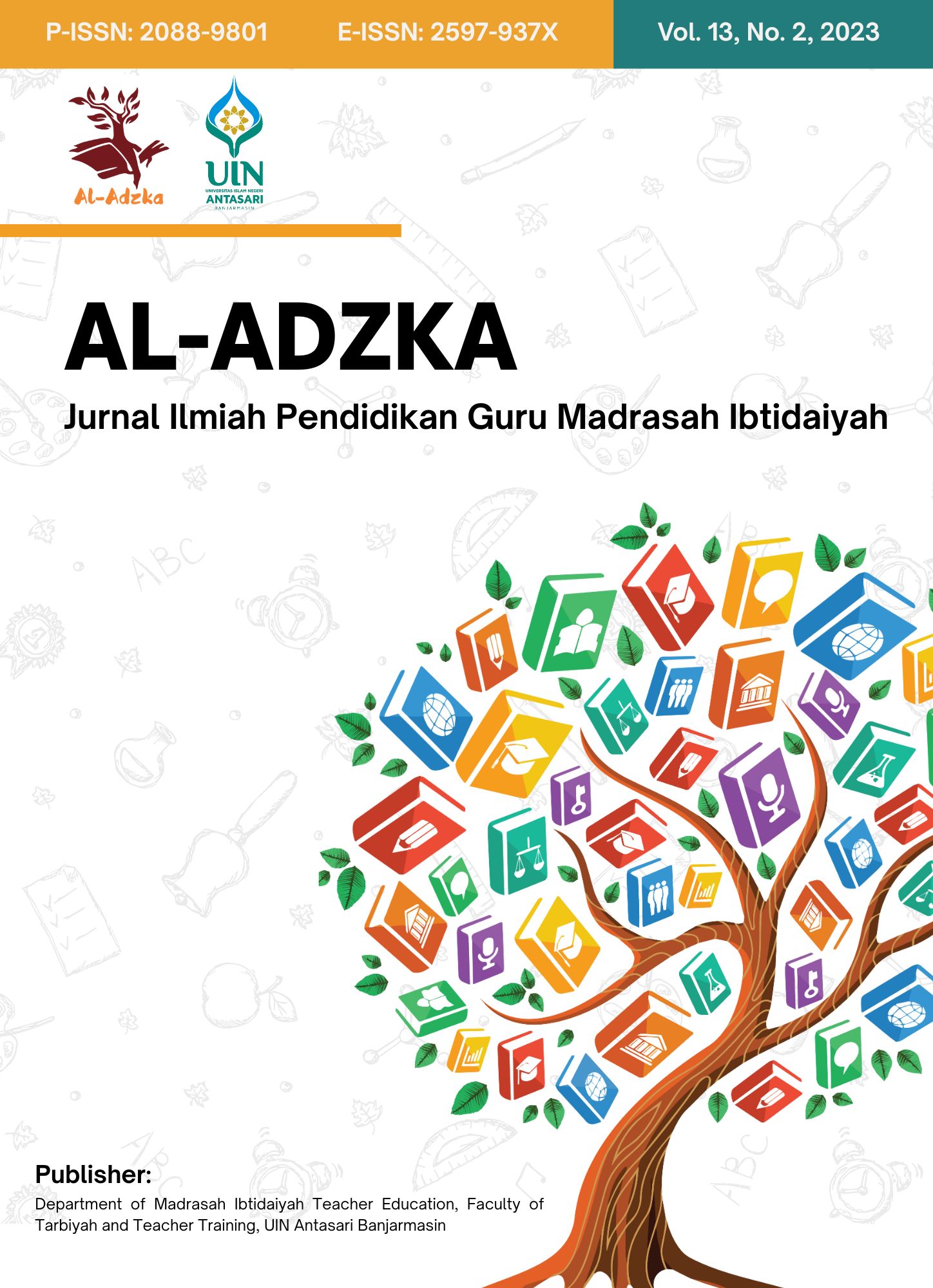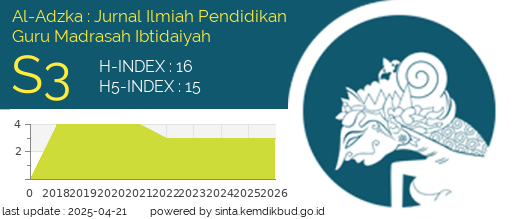Development of Class V Literacy and Numeration Questions Based on ESD on The Theme The Environment is Our Friend at SDN 2 Kuta
DOI:
https://doi.org/10.18592/aladzkapgmi.v13i2.11433Abstract
This research is motivated by the idea that the implementation of Education for Sustainable Development (ESD)-based learning can be a solution for teachers to instill awareness of the importance of preserving the environment. The purpose of this study was to produce test questions based on ESD literacy and numeracy based on the environmental theme of our friends, the sub-theme of humans and the environment. The research method used is Design Based Research (DBR) with the Reeves Model stages. The design of the test questions of 30 multiple choice questions was validated by 2 teachers. The validation results were then used as a guideline for revising which was then continued with trials on fifth grade students at SDN 1 Kuta. The results of the data analysis showed that based on the different test with Ms Excel, there were 2 questions that were rejected, 11 questions that were accepted and 17 questions that needed to be revised. Based on the results of the analysis of the level of difficulty, there are 3 questions in the easy category, 6 questions in the difficult category and 21 questions in the medium category. Based on the results of the validity analysis of the 30 questions tested, 15 questions were declared valid and 15 questions were declared invalid. Furthermore, valid questions were used as evaluation questions for fifth grade students at SDN 2 Kuta.References
Ardellea, F., & Hamdu, G. (2022). Pentingnya Kemampuan Guru Sekolah Dasar dalam Mengembangkan Soal Tes Literasi dan Numerasi Berbasis Education for Sustainable Development (ESD). Edu Cendikia: Jurnal Ilmiah Kependidikan, 2(02), 220–227. https://doi.org/10.47709/educendikia.v2i02.1587
Chall, J. (1983). Stages of Reading Development. In The Psychology of Reading. McGrawHill. https://doi.org/10.4324/9780203357798-19
Ekowati, D. W., Astuti, Y. P., Utami, I. W. P., Mukhlishina, I., & Suwandayani, B. I. (2019). Literasi Numerasi di SD Muhammadiyah. ELSE (Elementary School Education Journal) : Jurnal Pendidikan Dan Pembelajaran Sekolah Dasar, 3(1), 93. https://doi.org/10.30651/else.v3i1.2541
Hák, T., Janoušková, S., & Moldan, B. (2016). Sustainable Development Goals: A need for relevant indicators. Ecological Indicators, 60, 565–573. https://doi.org/10.1016/j.ecolind.2015.08.003
Hanifah, N. (2014). Perbandingan Tingkat Kesukaran , Daya Pembeda Pelajaran Ekonomi. SOSIO E-Kons, 6(1), 41–55.
Indrati, D. A., & Hariadi, P. P. (2016). ESD ( Education for Sustainable Development) Melalui Pembelajaran Biologi. Symposium on Biology Education, 12, 371–382.
Laurie, R., Nonoyama-Tarumi, Y., Mckeown, R., & Hopkins, C. (2016). Contributions of Education for Sustainable Development (ESD) to Quality Education: A Synthesis of Research. Journal of Education for Sustainable Development, 10(2), 226–242. https://doi.org/10.1177/0973408216661442
Listiawati, N. (2011). Relevansi Nilai-Nilai ESD dan Kesiapan Guru Dalam Mengimplementasikannya di Sekolah. Jurnal Pendidikan Dan Kebudayaan, 17(2), 135–152. https://doi.org/10.24832/jpnk.v17i2.13
Maghfiroh, F. L., Amin, S. M., Ibrahim, M., & Hartatik, S. (2021). Keefektifan Pendekatan Pendidikan Matematika Realistik Indonesia terhadap Kemampuan Literasi Numerasi Siswa di Sekolah Dasar. Jurnal Basicedu, 5(5), 3342–3351. https://doi.org/10.31004/basicedu.v5i5.1341
Mahmud, M. R., & Pratiwi, I. M. (2019). Literasi Numerasi Siswa Dalam Pemecahan Masalah Tidak Terstruktur. KALAMATIKA Jurnal Pendidikan Matematika, 4(1), 69–88. https://doi.org/10.22236/KALAMATIKA.vol4no1.2019pp69-88
Marini, Maya, et al. (2022). Problems in Mathematics Learning Multiple Materials Viewed From Low-Grade Students’ Learning Interest Aspect. Al-Adzka: Jurnal Ilmiah Pendidikan Guru Madrasah Ibtidaiyah, 12(2), 67–75. https://doi.org/10.18952/aladzkapgmi.v12i2.6948
Niss, M., & H. (2019). Mathematical competencies revisited. Educational Studies in Mathematics.102(1)
Prima, E., & Lestari, P. I. (2018). The Improvement of The Discipline for Early Childhood Through Token Economy Technique. Jurnal Obsesi : Jurnal Pendidikan Anak Usia Dini, 2(2), 245. https://doi.org/10.31004/obsesi.v2i2.124
Rahmawati, A. N. (2021). Analisis Kemampuan Literasi Numerasi Pada Siswa Kelas 5 Sekolah Dasar. Prosiding Seminar Nasional Integrasi Matematika Dan Nilai Islami, 4(1), 59–65. http://conferences.uin-malang.ac.id/index.php/SIMANIS/article/view/1502%0Ahttp://conferences.uin-malang.ac.id/index.php/SIMANIS/article/download/1502/725
Rakhmayani, R., & Hamdu, G. (2021). Kemampuan Guru Sekolah Dasar dalam Mengembangkan Soal Tes Berpikir Kritis Berbasis ESD. MIMBAR PGSD Undiksha, 9(2), 320. https://doi.org/10.23887/jjpgsd.v9i2.35296
Riyani, R., Maizora, S., & Hanifah, H. (2017). Uji Validitas Pengembangan Tes Untuk Mengukur Kemampuan Pemahaman Relasional Pada Materi Persamaan Kuadrat Siswa Kelas Viii Smp. Jurnal Penelitian Pembelajaran Matematika Sekolah (JP2MS), 1(1), 60–65. https://doi.org/10.33369/jp2ms.1.1.60-65
Rohmah, L., Ultas, F. :, Tarbiyah, I., Uin, K., & Kalijaga, S. (2014). Implementasi Kurikulum Berbasis Education For Sustainable Development (ESD) Di SDIT Internasional Luqman Hakim Yogyakarta. Al-Bidayah : Jurnal Pendidikan Dasar Islam, 6(2). https://doi.org/10.14421/AL-BIDAYAH.V6I2.139
Rusman. (2015). Curriculum Implementation at Elementary Schools: A Study on “Best Practices” Done by Elementary School Teachers in Planning, Implementing, and Evaluating the Curriculum. Journal of Education and Practice, 6(21), 106–112. http://search.proquest.com/docview/1773225459?accountid=8330
Santika, G. N., Suastra, W., Bagus, I., & Arnyana, P. (2022). Membentuk Karakter Peduli Lingkungan Pada Siswa Sekolah Dasar Melalui Pembelajaran IPA. JURNAL EDUCATION AND DEVELOPMENT, 10(1), 207–212. https://doi.org/10.37081/ED.V10I1.3382
Simanjuntak, F. N. (2017). Pendidikan untuk pembangunan berkelanjutan. Jurnal Dinamika Pendidikan, 10(2), 169–195. https://doi.org/https://doi.org/10.51212/jdp.v10i2.614
Stacey, K., & Turner, R. (2015). The Evolution and Key Concepts of the PISA Mathematics Frameworks. In Assessing Mathematical Literacy (pp. 5–33). Springer International
Hák, T., Janoušková, S., & Moldan, B. (2016). Sustainable Development Goals: A need for relevant indicators. Ecological Indicators, 60, 565–573. https://doi.org/10.1016/j.ecolind.2015.08.003
Lamada, M., Rahman, E. S., & Herawati, H. (2020). Analisis Kemampuan Literasi Siswa Smk Negeri Di Kota Makassar. Jurnal MEKOM (Media Komunikasi Pendidikan Kejuruan), 6(1), 35–42. https://doi.org/https://doi.org/10.26858/mekom.v6i1.12000
Laurie, R., Nonoyama-Tarumi, Y., Mckeown, R., & Hopkins, C. (2016). Contributions of Education for Sustainable Development (ESD) to Quality Education: A Synthesis of Research. Journal of Education for Sustainable Development, 10(2), 226–242. https://doi.org/10.1177/0973408216661442
Listiawati, N. (2011). Relevansi Nilai-Nilai ESD dan Kesiapan Guru Dalam Mengimplementasikannya di Sekolah. Jurnal Pendidikan Dan Kebudayaan, 17(2), 135–152. https://doi.org/10.24832/jpnk.v17i2.13
Mahmud, M. R., & Pratiwi, I. M. (2019). Literasi Numerasi Siswa Dalam Pemecahan Masalah Tidak Terstruktur. KALAMATIKA Jurnal Pendidikan Matematika, 4(1), 69–88. https://doi.org/10.22236/KALAMATIKA.vol4no1.2019pp69-88
Marini, Maya, et al. (2022). Problems in Mathematics Learning Multiple Materials Viewed From Low-Grade Students’ Learning Interest Aspect. Al-Adzka: Jurnal Ilmiah Pendidikan Guru Madrasah Ibtidaiyah, 12(2), 67–75. https://doi.org/10.18952/aladzkapgmi.v12i2.6948
Marwa, N. W. S., & Hamdu, G. (2021). Analysis of Critical Thinking Test Type Hots Based on Education for Sustainable Development in Primary School. Primary: Jurnal Pendidikan Guru Sekolah Dasar, 10(4), 785.
Prima, E., & Lestari, P. I. (2018). The Improvement of The Discipline for Early Childhood Through Token Economy Technique. Jurnal Obsesi : Jurnal Pendidikan Anak Usia Dini, 2(2), 245. https://doi.org/10.31004/obsesi.v2i2.124
Rahmawati, A. N. (2021). Analisis Kemampuan Literasi Numerasi Pada Siswa Kelas 5 Sekolah Dasar. Prosiding Seminar Nasional Integrasi Matematika Dan Nilai Islami, 4(1), 59–65. http://conferences.uin-malang.ac.id/index.php/SIMANIS/article/view/1502%0Ahttp://conferences.uin-malang.ac.id/index.php/SIMANIS/article/download/1502/725
Rakhmayani, R., & Hamdu, G. (2021). Kemampuan Guru Sekolah Dasar dalam Mengembangkan Soal Tes Berpikir Kritis Berbasis ESD. MIMBAR PGSD Undiksha, 9(2), 320. https://doi.org/10.23887/jjpgsd.v9i2.35296
Riyani, R., Maizora, S., & Hanifah, H. (2017). Uji Validitas Pengembangan Tes Untuk Mengukur Kemampuan Pemahaman Relasional Pada Materi Persamaan Kuadrat Siswa Kelas Viii Smp. Jurnal Penelitian Pembelajaran Matematika Sekolah (JP2MS), 1(1), 60–65. https://doi.org/10.33369/jp2ms.1.1.60-65
Rohmah, L., Ultas, F. :, Tarbiyah, I., Uin, K., & Kalijaga, S. (2014). Implementasi Kurikulum Berbasis Education For Sustainable Development (ESD) Di SDIT Internasional Luqman Hakim Yogyakarta. Al-Bidayah : Jurnal Pendidikan Dasar Islam, 6(2). https://doi.org/10.14421/AL-BIDAYAH.V6I2.139
Rusman. (2015). Curriculum Implementation at Elementary Schools: A Study on “Best Practices” Done by Elementary School Teachers in Planning, Implementing, and Evaluating the Curriculum. Journal of Education and Practice, 6(21), 106–112. http://search.proquest.com/docview/1773225459?accountid=8330
Santika, G. N., Suastra, W., Bagus, I., & Arnyana, P. (2022). Membentuk Karakter Peduli Lingkungan Pada Siswa Sekolah Dasar Melalui Pembelajaran IPA. JURNAL EDUCATION AND DEVELOPMENT, 10(1), 207–212. https://doi.org/10.37081/ED.V10I1.3382
Simanjuntak, F. N. (2017). Pendidikan untuk pembangunan berkelanjutan. Jurnal Dinamika Pendidikan, 10(2), 169–195. https://doi.org/https://doi.org/10.51212/jdp.v10i2.614
Stacey, K., & Turner, R. (2015). The Evolution and Key Concepts of the PISA Mathematics Frameworks. In Assessing Mathematical Literacy (pp. 5–33). Springer International Publishing. https://doi.org/10.1007/978-3-319-10121-7_1
Supriyati, Y., & Muqorobin, M. (2021). Mixed Model Cipp Dan Kickpatrick Sebagai Pendekatan Evaluasi Program Pengembangan Kompetensi Guru Berbasis Kebutuhan Peningkatan Kemampuan Asessement Literasi-Numerasi (Cilapp Model Dalam Evaluasi Program). Jurnal Ilmiah Mandala Education, 7(1). https://doi.org/10.58258/JIME.V7I1.1733
Susanto, H., Rinaldi, A., & Novalia, N. (2015). Analisis Validitas Reliabilitas Tingkat Kesukaran Dan Daya Beda Pada Butir Soal Ujian Akhir Semester Ganjil Mata Pelajaran Matematika Kelas Xii Ips Di Sma Negeri 12 Bandar Lampung Tahun Ajaran 2014/2015. Al-Jabar : Jurnal Pendidikan Matematika, 6(2), 203–218. https://doi.org/10.24042/ajpm.v6i2.50
Susilawati, S., Nawawi, M. A., & N, A. M. (2019). Rekonstruksi Sistem Melalui Pendekatan Pendidikan Untuk Pembangunan Yang Berkelanjutan. Andragogi: Jurnal Pendidikan Islam Dan Manajemen Pendidikan Islam, 1(2), 218–241. https://doi.org/10.36671/andragogi.v1i2.55
Tare, M. (2020). Education for Sustainable Development. Technology & Innovation, 21(4), 1–3. https://doi.org/10.21300/21.4.2020.2
Umroh, Y. U., Hamdu, G., Nugraha, A., & Hadiana, D. (2023). Kompetensi Literasi dan Numerasi Berbasis Education for Sustainable Development di Sekolah Dasar. Naturalistic: Jurnal Kajian Dan Penelitian Pendidikan Dan Pembelajaran, 8(1), 42–47. https://doi.org/10.35568/naturalistic.v8i1.2364
Waltner, E.-M., Rieß, W., & Brock, A. (2018). Development of an ESD Indicator for Teacher Training and the National Monitoring for ESD Implementation in Germany. Sustainability, 10(7), 2508. https://doi.org/10.3390/su10072508
Downloads
Published
How to Cite
Issue
Section
License
Copyright (c) 2023 Dyah Indraswati, Khairunnisa, Ilham Syahrul Jiwandono, Aisa Nikmah Rahmatih, Hikmah Ramdhani Putri

This work is licensed under a Creative Commons Attribution 4.0 International License.
Authors who publish with this journal agree to the following terms:
- Authors retain copyright and grant the journal right of first publication with the work simultaneously licensed under a Creative Commons Attribution 4.0 International that allows others to share the work with an acknowledgement of the work's authorship and initial publication in this journal.
- Authors are able to enter into separate, additional contractual arrangements for the non-exclusive distribution of the journal's published version of the work (e.g., post it to an institutional repository or publish it in a book), with an acknowledgement of its initial publication in this journal.
- Authors are permitted and encouraged to post their work online (e.g., in institutional repositories or on their website) prior to and during the submission process, as it can lead to productive exchanges, as well as earlier and greater citation of published work.












